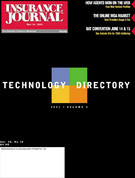Only few would disagree that we are on the threshold of an economic revolution of some kind. No one knows just what it is yet because it is all around us and we have no high point from which we can get a better look. That will come, of course, but only later on. I am not referring to the current confusion on Wall Street. This particular revolution is much larger. And I say “revolution” because it is big and happening pretty fast. It has to do with technology, computers, instant connectivity and miniaturization among other things.
This revolution we sit at the edge of has already changed and will change further how we bank, get educated and trained, arrange our travel, buy our insurance and how many of us work. It is the business of how we work that may bear a closer look.
The last great economic upheaval-the Industrial Revolution-brought most of us in from the fields to the factories and offices in the city signaling a seismic shift in how goods and services were generated. And how insurance was written to address the new risks. It was a get-up-in-the-morning-and-go-to-work world. In the early 1950s William Whyte, the social reformist and Fortune magazine staff writer, defined the results of this great shift in his important book, “The Organization Man.”
Now barely a half century later, we find ourselves on the cusp of what promises to be another major shift, thanks largely to the new technology. And it may herald significant changes in how some business insurance ought to be written.
Replacing Whyte’s Organization Man is a new work symbol-the “free agent.” This is a person who works untethered to a large organization. These independent workers include the self-employed, freelancers, “e-lancers,” independent contractors, home-based businesspeople, solo practitioners, professionals and operators of micro-enterprises. Over the last decade the number of these de-organizing workers has risen steadily to 23.6 million last year from 4 million in 1990, according to data collected by Joanne H. Pratt Associates, a Dallas firm that studies telecommuting trends. That’s better than 20 percent of American workers.
Daniel H. Pink, in his just-published book, “Free Agent Nation,” offers the definitive account of this work revolution. Pink clearly summarizes what this major shift in the definition of employment now means to millions of us and explains the various types of free agents and discusses why they have chosen this independent path. A contributing editor at the magazine, Fast Company, Pink spent the last two years interviewing hundreds of soloists, temps, and micropreneurs about their work and lives in the preparation of his book.
And the book’s reception? Listen to what Tom Peters (author of “In Search of Excellence”) says as an example: ” ‘Free Agent Nation’ is the best book on work life since William H. Whyte, Jr.’s ‘The Organization Man’. . . . Pink is the brilliant analyst-balladeer of work in the new economy. Confident prediction: 25 years from now we’ll still be discussing ‘Free Agent Nation.’ ”
Pink’s articles, essays and book reviews on business, work and technology have appeared in The New York Times, The New Republic, George, The Washington Monthly, The Worldly Investor, Fast Company and other publications. He’s also a frequent commentator and book reviewer for Public Radio International’s “Marketplace” program. Dan’s last real job was in the White House, where he served from 1995 to 1997 as chief speechwriter to Vice President Al Gore.
Who will be first to offer Free Agent coverage?
Topics Agencies
Was this article valuable?
Here are more articles you may enjoy.


 After Falling 6% in 2025, Average Auto Insurance Cost Will Stabilize in 2026, Says Insurify
After Falling 6% in 2025, Average Auto Insurance Cost Will Stabilize in 2026, Says Insurify  MAPFRE Denied Injunction Against AAA Auto Insurance Sales in Massachusetts
MAPFRE Denied Injunction Against AAA Auto Insurance Sales in Massachusetts  Allstate CEO Wilson Takes on Affordability Issue During Earnings Call
Allstate CEO Wilson Takes on Affordability Issue During Earnings Call  What Analysts Are Saying About the 2026 P/C Insurance Market
What Analysts Are Saying About the 2026 P/C Insurance Market 


